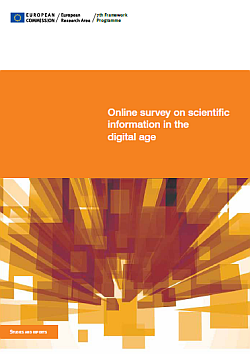Posted: April 17th, 2012 | Author: Sven | Filed under: Report | Tags: academic publishing, European Commission, Open Data, Research Data | 1 Comment »
 These days, the European Commission has just published the results of a consultation regarding accessibility and preservation of digital publications and research data in the European Union.
These days, the European Commission has just published the results of a consultation regarding accessibility and preservation of digital publications and research data in the European Union.
Commissioner Neelie Kroes, responsible for the digital agenda for Europe, has launched this consultation in July 2011 for seeking views on access to and preservation of digital scientific information – to be more precisely, the survey broached the issues of Open Access for scientific publications, accessibility of research data and digital long term preservation.
The purpose of the consultation was to gather information from as many sources as possible and receive important input for the future development of policy options in the area of scientific information in the digital age.
Read the rest of this entry »
Posted: April 13th, 2012 | Author: Sven | Filed under: Data Sharing, Research Data | Tags: academic publishing, data publication, Linking Data and Publications, Open Data | Comments Off on Linking and lightening: LabArchives and BioMed Central create a new platform for publishing scientific data
 Sharing and reuse of data has become a vital part of modern scientific research. Having access to datasets ensures that the pace of scientific discovery is not unnecessarily hindered by data being kept under lock and key or hidden away in lab drawers.
Sharing and reuse of data has become a vital part of modern scientific research. Having access to datasets ensures that the pace of scientific discovery is not unnecessarily hindered by data being kept under lock and key or hidden away in lab drawers.
In this context I read some interesting news: As part of the commitment to reproducible research and transparency, BioMed Central has now partnered with LabArchives to work together for the shared goal of making datasets supporting peer-reviewed publications available and permanently linked to online publications – and available under terms which permit reuse freely, as Open Data.
Read the rest of this entry »
Posted: March 23rd, 2012 | Author: Sven | Filed under: journals, Opinion | Tags: academic publishing, access to data, Linking Data and Publications | 1 Comment »
 Already a while ago, in fall 2010 the Journal of Neuroscience announced that it will stop hosting and peer-reviewing supplementary material for articles, so authors are no longer allowed to include any additional materials when they submit new manuscripts. A radical cut and a practice I haven’t heard of yet.
Already a while ago, in fall 2010 the Journal of Neuroscience announced that it will stop hosting and peer-reviewing supplementary material for articles, so authors are no longer allowed to include any additional materials when they submit new manuscripts. A radical cut and a practice I haven’t heard of yet.
Despite the fact that this journal is neither part of our research sample for EDaWaX’s work package 2 nor in the scientific field of Economics it is worth to investigate the motivation for banning the supplements.
And of course it is interesting to notice what the journal proposes to do instead of hosting and peer-reviewing supplementary material. Read the rest of this entry »
Posted: February 29th, 2012 | Author: Sven | Filed under: Data Sharing, Opinion | Tags: academic publishing, open access, science | Comments Off on Research Works Act: Partial victory for Open Access
 telepolis yesterday reported that the Research Works Act was pulled back. The bill has caused a lot of trouble within the Open-Access and Open-Data Community: HR 3699 would have prevented agencies of the federal government from requiring public access to federally subsidized research.
telepolis yesterday reported that the Research Works Act was pulled back. The bill has caused a lot of trouble within the Open-Access and Open-Data Community: HR 3699 would have prevented agencies of the federal government from requiring public access to federally subsidized research.
A major supporter of the bill, Elsevier, has withdrawed its support for the Research Works Act – only hours before the the co-sponsors of the bill, Darrell Issa (Republican) and Carolyn Maloney (Democrats) declared the end of the legislation process. It’s interesting (but not surprising) that after Elsevier withdrawed its support, the whole bill was stopped. Someone might think, that this course of action shows the real backers of the bill.
Read the rest of this entry »
Posted: February 23rd, 2012 | Author: Sven | Filed under: fraud, journals | Tags: academic publishing, Citation, impact factor, ranking | Comments Off on Science Magazine: Coercive Citation in Academic Publishing
 As many of you know, the impact factor is a major vehicle for measuring the quality of a scholarly journal. Despite there is a lot of criticism on impact factors, for researchers as well as for journals a high impact factor is as attractive as honey is for the bears.
As many of you know, the impact factor is a major vehicle for measuring the quality of a scholarly journal. Despite there is a lot of criticism on impact factors, for researchers as well as for journals a high impact factor is as attractive as honey is for the bears.
One side effect of impact factors is that they’re creating incentives for editors to coerce authors to add citations to their journal – indicating that more citations are inflating the journal’s impact factor.
At the beginning of February, the science magazine published a remarkable article that deals with forced citations in scholarly journals.
Read the rest of this entry »
 These days, the European Commission has just published the results of a consultation regarding accessibility and preservation of digital publications and research data in the European Union.
These days, the European Commission has just published the results of a consultation regarding accessibility and preservation of digital publications and research data in the European Union.
 Sharing and reuse of data has become a vital part of modern scientific research. Having access to datasets ensures that the pace of scientific discovery is not unnecessarily hindered by data being kept under lock and key or hidden away in lab drawers.
Sharing and reuse of data has become a vital part of modern scientific research. Having access to datasets ensures that the pace of scientific discovery is not unnecessarily hindered by data being kept under lock and key or hidden away in lab drawers. telepolis
telepolis 





